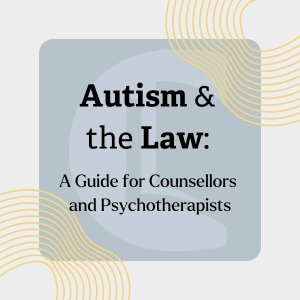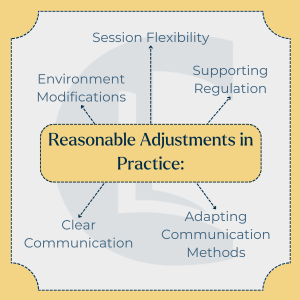Autism-Informed Practice Course
Gain the Knowledge & Skills to Support Autistic Clients with Confidence & Compassion
The following article is taken from our Autism-Informed Practice course.

Gain the Knowledge & Skills to Support Autistic Clients with Confidence & Compassion
All legislation is accurate at the time of publishing.
Understanding how autistic individuals are protected by UK law is essential for counsellors and psychotherapists. It directly impacts your responsibilities when working with neurodivergent clients. This article will explore autism and the law by looking at the legal framework for safeguarding autistic individuals, focusing on your obligations to make reasonable adjustments and enhance therapeutic accessibility.

Autism and the Law – A Guide for Counsellors and Psychotherapists
By the end of this article, you will:
Ken Kelly: There is a great opportunity in doing training to work with a neurodivergent client, because it may broaden our client base, which adds sustainability to our practice.
And we need to look at what the law says about this, Rory.
Rory Lees-Oakes: Yeah, absolutely, Ken. And I think a good place to start really is first principles. The first place we go when we’re thinking about our practice is the ethical framework. Most ethical frameworks, depending on which professional body that you’re a member of, always say you have to obey the law that’s written into ethics.
And in the law we’re talking about in this case, there’s actually two laws, is the Equality Act of 2010, and the autism acts of 2009. And I think it’s really important that we understand that if we’re to be inclusive therapists, it’s really important that we make sure we can accommodate something called reasonable adjustments.
And what reasonable adjustments are, is that we adjust for people who come to our practice. A very simple one, which I think everybody can visualise is, does your practice have wheelchair access?
But actually, I think neurodivergence and autism is something that perhaps goes under the radar a bit, Ken. And I think, part of what we’re doing is to raise awareness and to start that conversation about, what are reasonable adjustments for people who are either neurodivergent or autistic?
Ken Kelly: 100%. And as you said, Rory, we’re called upon by the law to consider those reasonable adjustments. And we’re speaking obviously from the United Kingdom, so if you’re outside of the United Kingdom, have a look at what legislation applies to you and your practice.
So the Equality Act of 2010, I think would be pretty well known if you studied counselling or you are working as a counsellor, that is an act that you would be familiar with, because you’re gonna be working to that law. But what is maybe not as well known, is the Autism Act of 2009. It predates the Equalities Act 2010, the Autism Act. And I’d like to just read a bit of a précis of what this is. This is the Autism Act 2009, it’s a pioneering law, the first disability specific legislation in the UK.
It mandates the government to implement and update the adult autism strategy, focusing on improving services for autistic clients, while it primarily targets broader social services, its ethos of protective support aligns with therapeutic practice, where you must continually review and adapt to the needs of the neurodivergent client.
That is a law that is in place in the United Kingdom. The big takeaway is that we are called upon to continually review and adapt to the needs of the neurodivergent client. And that’s what you’re speaking about, Rory, when you say reasonable adjustments. And of course, we’re talking here about our anticipatory duty.
Rory Lees-Oakes: Absolutely right, Ken.
And just to roll back just a little before we speak about anticipatory duties. There is another law called the Children and Families Act of 2014 for children and young people. And that is going to speak directly to those practitioners who may be working in schools or colleges. I think it’s really useful to be aware of that act because some children who are autistic may have education, health and care plans, and part of that, the counsellor may be involved with. But to move on to anticipatory duty, I think it’s the interesting one.
I think the clue very much is in the phraseology, anticipate what clients may need. And I think what that really means is how are we flexible in our practice to support any area where people may be disabled? I use that word thoughtfully.
How are you going to adapt your practice for specific clients? If we’re talking about neurodivergent autistic clients, there are a few things we know. And a very simple one, and I know you’ve spoken about this so often is, if you’ve got a clock in the room.
Does it tick? Or is it one of those that is silent? If it’s a ticking clock, that might be very distracting to someone who’s autistic, because some autistic people hear background sounds as loud as they hear someone speaking to them.
So part of it, is to do a bit of an audit about practice rooms. Is your practice room neurodivergent friendly? What happens if you have a client who says look I really don’t like bright lights, can you turn your lights off? Or what about a client who says I get really distracted, have you got any fidget toys or anything?
And what about just a very simple one? A client says, I can only do half an hour today because I’m having a really bad day, my energy levels are depleted. Are you okay with that? And I think it’s really about making sure that we form and shape our practice for those who are neurodivergent, just as we would if someone was a wheelchair user. We must try our best for all areas of equality, and autism is one of those.
And to be quite frank, it’s a growing area.
Ken Kelly: Yeah, very much beautifully said there, Rory. And we’re going to naturally touch on areas and suggestions that we have mentioned before. Why? Because they fall into this legislation, they fall into what we’re talking about. So it’s not us just repeating it.
It’s because it’s relevant to what we’re saying here, and you mentioned when you went into this anticipatory, that it’s, that word there is anticipating what somebody’s needs are. And we’re called upon to think about this. The first step of anticipating needs is to have an understanding of that person and of that sector.
So if we’re speaking about neurodivergence, it starts with CPD. You mentioned how important CPD is. We cannot anticipate that we don’t know. You don’t know, what you don’t know. So it is out of awareness, it’s not there at all. So by doing the correct CPD, by doing the correct training, it gives us an indication of how a neurodivergent person may present all the challenges that they may face.
With that information, and in consultation with that client, we may then anticipate what needs that person may have. And you spoke about a number of different factors we would cover, the domains we map to are environmental modifications. Like you said, Rory, it might be sound, it might be light, it might be temperature.
What is it within our environment that we can adjust to make that person feel more comfortable? And how do we find out what it is that they need, to be able to make that adjustment? Session flexibility, counsellor, it’s obviously an hour long session or a 50 minute session with five minutes hello and five minutes goodbye.
If we’re talking about reasonable adjustments, we’re talking about that anticipatory duty of therapists, then maybe we need to look, can we be flexible in our sessions? And then, of course, clear communication, counselling and psychotherapy is about communication.
It’s about a client coming in, bringing where they’re at, and how life is for them, and what they might be carrying. And without any communication, we’re not going to go anywhere. So we need clear communication. If we look at neurodivergence, it tends to be a communication challenge. There are challenges there.
People might need to hear things differently. You might need to maybe draw things, you might need to have diagrams. So you would, again, need to anticipate what could I do to improve communication for this specific person? And then, of course, supporting regulation within neurodivergence, maybe a fidget spinner or something like that.
Maybe the person would like to stim and stim is short for stimulator, self-stimulation. It is a way of self-soothing for that individual within a moment. I, myself, stim. I have things that I do that will restore my points, and make me feel better, and energise me if I’m in a difficult situation.
Can you imagine a client coming in and maybe having a little spinny toy that they’ve got on our table within our therapy room and they start spinning it and the therapist, not understanding that, saying, ooh, I’d rather you put that away so that we can concentrate on the therapy.
Just think how that would be for that individual that they’re doing to self regulate. Can we support that regulation? Understanding what stimming is and what that may look like, having that open communication and discussing it with the client and making allowances.
So Rory, as we go into what is my anticipated duty, what CPD might I do? How do I approach the conversation about adjustments with clients?
Rory Lees-Oakes: Yes, and this anticipatory duty, I think speaks to reflection and reflexivity.
Reflection is what all therapists should do. Just have a think about the shape of our practice and what it looks like from the outside, from the client’s frame of reference.
That includes any advertising or marketing we do. How are you going to communicate to autistic or neurodivergent clients that you are neurodivergent or autistic friendly. How are you going to give clients confidence to call you? Where in the past they’ve had real difficulty with therapists because they really didn’t understand the neurodivergent world.
So I think that’s a real good starting point. Some of the things you might want to think about is CPD. By doing continual professional development, you will understand and begin to appreciate the struggle that neurodivergent clients may have when accessing therapy.
I think all therapists need to think about the shape of their practice, and look at ongoing CPD, and also about how do you approach the conversation about adjustments with clients?
And I think here it might be useful to think about where you meet the client. The first time you meet a client probably isn’t face to face, it’s probably through your directory listings, your website, or your social media. That conversation should really start there, explaining about how your neurodivergence affirming, how you work with neurodivergent people, how you’re happy to talk about reasonable adjustments.
And of course, that speaks to contracting. When you’re putting your offer together, show the potential client that you will help them, that you will be there for them, and that you will make those reasonable adjustments. And I think finally ongoing collaboration, with colleagues and supervisors. Having a supervisor that is neurodivergent informed or autistically informed is going to be so helpful.
Supervisors should have a working knowledge of working with autistic clients. Because, you’re asking them for professional consultation, if they haven’t got that area, they should either get skilled up on it, or they should refer you on.
And then I think tools and approaches, how do we modify the therapy room? How do you modify the environment? By having those conversations, you’re going to get a very rich seam of information. How you can adapt not only what the client experiences in the therapy room, but also your approach on how you communicate, what your practice looks like to a autistic or neurodivergent client.
Ken Kelly: Yeah, there’s lots in there, isn’t there? And what’s interesting, all of this just keys into the legislation. The legislation is asking us to look at this.
Any last thoughts today, Rory.
Rory Lees-Oakes: Yeah, I have a final thought.
It just takes one person in someone’s life. It just takes one person who’s aware, who can support and is knowledgeable and can offer an environment where that part of that person can be explored, that could change a life.
It’s so important. We do it all the time for clients, and we really need to do it for autistic and neurodivergent clients.
The Equality Act 2010 is a cornerstone of UK law protecting individuals from discrimination based on nine protected characteristics, including disability—which includes autism. This legislation ensures that autistic individuals cannot be discriminated against in areas such as employment, education, and access to services.
As a therapist, you must comply with the Equality Act, which includes an anticipatory duty to make reasonable adjustments to ensure your services are accessible to autistic clients—for example, offering flexible appointment times or making environmental modifications in your practice.
The Autism Act 2009 is a pioneering law as the first disability-specific legislation in the UK. It mandates the government to implement and update an Adult Autism Strategy, focusing on improving services for autistic adults. While it primarily targets broader social services, its ethos of proactive support aligns with therapeutic practice, where you must continually review and adapt to the needs of neurodivergent clients.
The current strategy is ‘The National Strategy for Autistic Children, Young People and Adults: 2021 to 2026‘, which replaced the previous ‘Think Autism‘ strategy published in 2014. This is the first strategy to extend support to children and young people, not just adults.

This act is crucial for counsellors working with children and young people. It includes provisions for individuals with special educational needs and disabilities (SEND) and introduces Education, Health, and Care (EHC) Plans. These plans are comprehensive support documents for children and young people up to 25, ensuring their educational, social, and healthcare needs are met.
Understanding this framework is vital when working with autistic children or young adults, especially in collaborative care settings.
Your anticipatory duty means you must plan for potential barriers autistic clients may face before entering your practice. This could involve both physical and operational changes to create a supportive environment.

Tracey Cleary, a neurodivergent counsellor, highlights the importance of adjustments that might seem minor but can have significant impact—for instance, using a white noise machine to neutralise distracting sounds or switching rooms to avoid outdoor noise. These adjustments show the importance of sensory consideration in therapeutic practice with neurodivergent clients.

As a counsellor or psychotherapist, your actions are guided by ethical standards and legal obligations that ensure your clients receive the best possible care. The concept of anticipatory duty under the Equality Act 2010 means that you must think ahead and plan for potential barriers that autistic clients might face when accessing your services.
Here are critical reflective questions and actions to consider in your practice:
By reflecting on these points and actively integrating them into your practice, you can ensure that your services are fully accessible to autistic clients, which aligns with ethical and legal expectations.
Autism and the Law – A Guide for Counsellors and Psychotherapists
Adapting your practice to meet the needs of autistic clients is not just a legal requirement under UK law—it’s an ethical responsibility that can dramatically improve the therapeutic process. By understanding your anticipatory duty, making reasonable adjustments, and engaging in open dialogue about client needs, you can ensure that your therapy practice is inclusive and effective for neurodivergent individuals.
Consider reflecting on your current practice. Do you engage in discussions about adjustments with your clients? What further CPD might you undertake to deepen your understanding of autism and the law? By addressing these questions, you can continue to improve your practice.
Department of Health. (2015). Statutory guidance for Local Authorities and NHS organisations to support the implementation of the Adult Autism Strategy. [online]. Gov.uk. [Accessed 25 April 2024].
Jackson, C. (2023). The big issue: Access all areas. [online]. BACP. [Accessed 25 April 2023].
Lawson, A. and Orchard, M. (2021). The Anticipatory Reasonable Adjustment Duty: Removing the Blockages? The Cambridge Law Journal. [Accessed 25 April 2024].
Nicholson, E. (2016). What works when counselling autistic clients? Healthcare Counselling and Psychotherapy Journal. [Accessed 25 April 2024].
Notice any broken link or issues with this resource? Kindly let us know by email
Email us